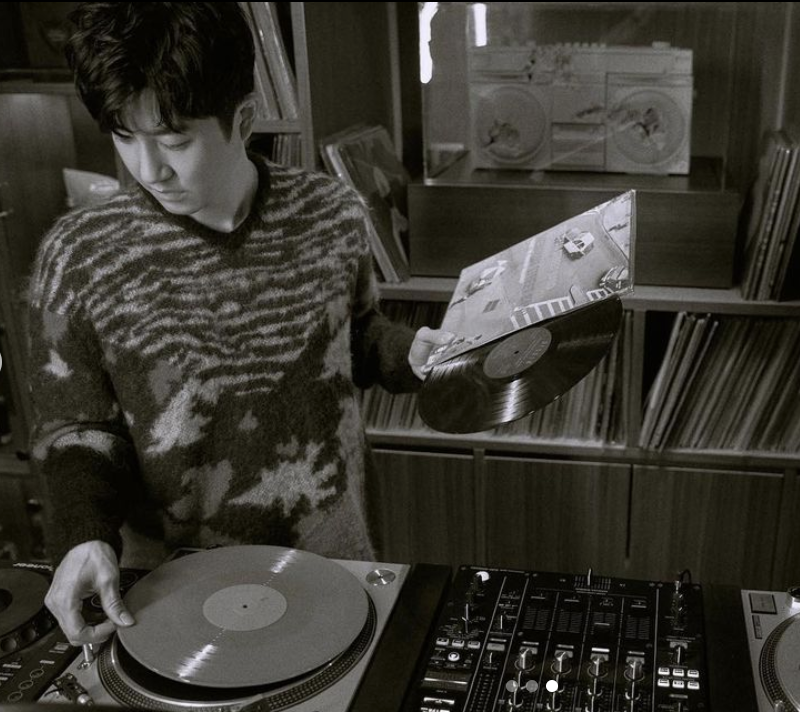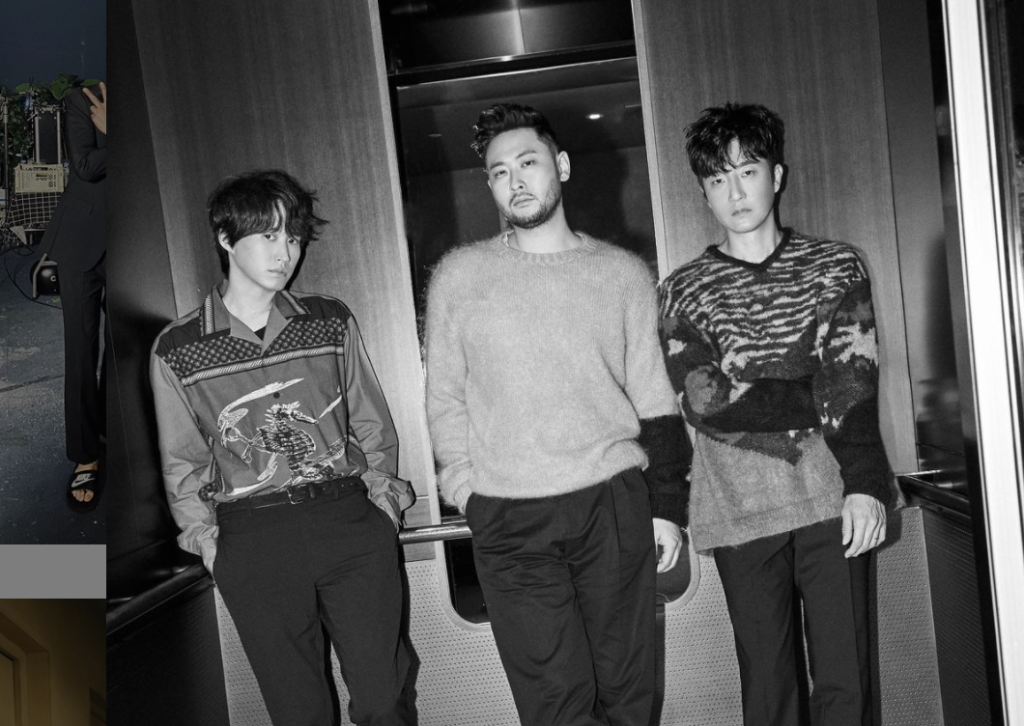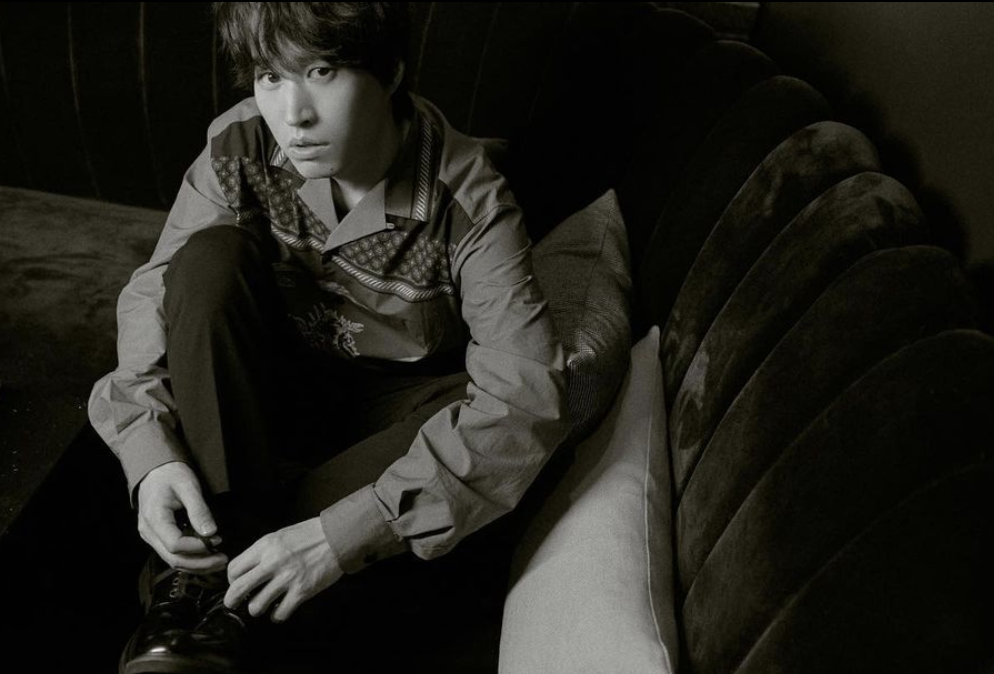
Given its self-assured title, one might expect Epik High Is Here to be a loud, braggadocious album. Yet it’s not. Epik High’s 10th full album instead concerns itself with stillness.
Epik High Is Here evokes the bone-chilling weariness that characterizes so many previous tracks by the group. Through a blend of muted jazz, startlingly insightful lyrics, and hard-edged trap influences, Epik High explore the ugliest crevasses of the human psyche. The resulting album has its highs and lows, but never fails to be thought-provoking.
Epik High Is Here’s first song, “Lesson Zero,” captivates immediately. Starting with drawn-out piano chords and distorted vocals, “Lesson Zero” then segues into an all-English rap from Tablo. Because the instrumentation is so simple, the focus remains squarely on Tablo’s lyrics. It’s hard to quote a single line from “Lesson Zero” because the entire song feels so vital. Nevertheless, I’ll try:
They teach you to heed the word of a God
who has never spoken
…
They got you hating who you are
to sell you pills and fictions
…
No more lessons,
please take me back to zero.
“Lesson Zero” bursts with myriad intriguing ideas: disillusionment with organized religion, unfair laws, the use of media to dull minds, and even brainwashing. Epik High’s indictment of the world around us is both alarming and deeply truthful. Particularly intriguing is Tablo’s plea to shrug off the delusions and hysteria, to return to “zero.” This lyric doesn’t seem like a call to action, but more so a defeated retreat. “Lesson Zero” may only be the very first song, but it’s perhaps the best on the album.
The various lyrical themes of “Lesson Zero” are woven throughout the rest of the album; this lends a cohesiveness to Epik High Is Here that’s rarely seen nowadays. For the most part, contemporary albums are playlists of disjoint (albeit compelling) songs. In direct contrast, Epik High Is Here often cycles back to the same themes — and “Lesson Zero” serves as a table of contents, so to speak; it mentions many of the themes that will be explored more elsewhere in the album. For example, the song’s religious references can be seen in “Rosario,” “Acceptance Speech,” “Social Distance 16,” and “End Of The World.”

Gina’s review of the album’s title track does such a good job of explaining the lyrics and Catholic subtext in “Rosario” that I won’t delve too deeply into it here, and recommend reading her article instead. But it’s noteworthy that Tablo ironically questions “Why are there so many saints?” (referencing their haters) before growling, “none of y’all fear God.” Epik High’s depiction of haters as hypocrites, who cling to clean saintly appearances but actually spread mindless hatred, adds further complexity to “Rosario”’s Catholic undertones. From an aural standpoint, the song features plenty of trap percussion, but also draws upon flamenco guitar (which is far rarer in the Korean music scene) to add interest.
“Acceptance Speech,” which includes a feature from former iKon member B.I, further explores the reality of our deeply flawed world and includes religious questions. Although the title suggests that Epik High are accepting an award, “Acceptance Speech” is actually a song about accepting the harsh truth of two-faced friends and shallow relationships — Epik High blurs the difference between “God” and “the Devil,” stating that the two are one entity with a dual personality. By breaking the boundary between good and evil, Epik High instead casts the world as a gray, confusing place.
The track’s musical choices only heighten this sense of melancholy; “Acceptance Speech” possesses the strongest melody from the album. B.I’s sung chorus is at once plaintive and almost apathetic — pairing perfectly with the muted old-school hip hop production.
The religious themes continue in “End Of The World,” a blend of acoustic guitar and trap. In this track, Mithra Jin questions why “the weight of crimes are different” and points out that “justice deflects wealth and survives corruption.” As Tablo raps, “This world goes to hell, burn,” suddenly the chorus (featuring G.Soul crooning, “I want you to love me / like it’s the end of the world”) feels far more sinister. Although “End Of The World”’s lyrics are quite prescient and timely, the music itself falls flat. Because there’s little variation from the same guitar and trap loops (both of which are commonly-used sounds), the song ends up becoming monotonous.
The last two songs with religious references are “Social Distance 16” and “Wish You Were,” both very short tracks. “Social Distance 16” has old-school hip hop influences, which evoke the soundscapes of “Acceptance Speech.” The song explains that Epik High chooses to have “Noah’s mindset” when being “rained on” by enemies. The Biblical allusion of Noah and the flood — the entire world was submerged by heavy rains, and only Noah had heeded God’s warnings to build a boat, which left him and his family as the sole survivors — highlights Epik High’s resilience in the face of haters.

“Wish You Were,” which sounds quite influenced by jazz, seemingly references “Social Distance 16” when Tablo raps, “For the last few years it’s been pourin’ rain.” Its instrumental hints at the second main theme of Epik High Is Here: jazz influences. “Based On A True Story,” “Leica,” and “In Self-Defense” all have the rich sound of bass (the stringed instrument, not the electric one), which evokes images of a dim-lit jazz club.
“Based On A True Story” is the most classically jazzy piece on the album. Its cascades of piano and warm bass chords create a warm, inviting environment for guest artist Heize’s smooth vocals and Epik High’s comparatively rougher raps.
Meanwhile, “Leica” (featuring Kim Sawol) juxtaposes mellow jazz piano with more jarring trap sounds. This combination of jazz and trap is too toned-down, and thus doesn’t truly showcase the best qualities of either genre. Lyrically, though, “Leica” stands out from the rest of the album — Epik High talk about their achievements like a passport filled with stamps (showing that the group has toured all over the world), “thousands of eyes shining brighter than stage lights,” and precious moments with their friends and family. The sweetness of Epik High’s raps is tempered by the chorus — “Never a peaceful day,” Kim Sawol sings, which is slightly ironic given the incredibly peaceful vocal delivery.

“In Self-Defense” more successfully blends jazz with trap. This song opens with a simple bass melody, but quickly turns to more menacing hip-hop percussion, as well as caustic raps courtesy of Epik High and featuring artists Woo, Nucksal, and Changmo. Since the song doesn’t have any real melody or a single memorable refrain, “In Self-Defense” must rely on various rap styles to stay interesting. Nucksal’s more staccato, higher-pitched style and Woo’s slurred delivery provide some much-needed modulation to the song.
“True Crime” (ft. Miso), is surprising in that it neither sounds jazzy nor has much religious undertones. Instead, the song feels EDM-inspired — there’s an (admittedly low-energy) chorus drop. The production here is very muffled; the synths all fade together at the edges, sometimes with trap or kick drums coming into sharper focus.
So, how does Epik High Is Here stack up to the group’s previous works?
Well, the music itself is honestly a letdown. The melodies are unmemorable (compared to past triumphs like “Spoiler,” “One,” and “Be”), with the sole exception of “Acceptance Speech.” And the overreliance on trap means that many of the tracks sound far too alike. But of course, we’re talking about Epik High — a group that consistently blurs the boundaries between “musical artist” and “poet” — so, as expected, the lyrics save the day. “Lesson Zero” and “Acceptance Speech” alone are worth the price of admission.
In conclusion, Epik High Is Here may or may not be worth a listen, depending on your genre preferences. Jazz or trap fans may indeed find much to love here, while others may find Epik High Is Here more monotonous. But regardless of whether you give this album a listen, you should certainly give it a read.
(YouTube. Images via YG Entertainment. Lyrics via Genius)


